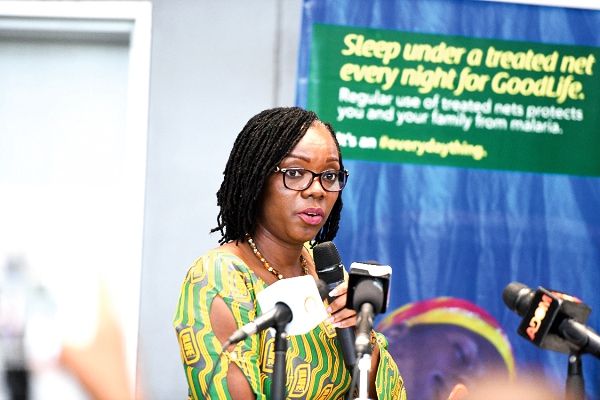Statistics made available to the National Malaria Control Programme by the Ghana Health Service indicate that there has been significant progress made in efforts to control malaria.
According to the data, malaria-related deaths of all ages in the country reduced by more than a quarter in 2018 compared to the previous year, 2017.
In 2018, 428 malaria deaths were recorded, indicating a 29 per cent reduction in malaria deaths compared to 2017 when 599 deaths were recorded.
Progress
The Programmes Manager of the National Malaria Control Programme, Dr Keziah Malm, made the revelation in her presentation at a media briefing ahead of ceremonies to commemorate Malaria Day which falls on April 25 each year.
This year’s Malaria Day is on the theme: “Zero malaria starts with me”, and seeks to highlight the need for political commitment and sustained investment in malaria prevention, control and elimination.
Presenting a progress report on malaria control in the country, Dr Malm said out of the total number of deaths as a result of malaria that was reported in 2018, there were 251 deaths among children under-five years compared to 327 in 2017.
In addition, she said confirmed cases of malaria reported reduced from 593,959 in 2017 to 510,210 in 2018, while the number of malaria admissions marginally increased to 351,163 in 2018 from 344,213 in 2017 representing an increase of two per cent.
Meanwhile, about 11 million suspected cases of malaria were recorded at various Outpatient Departments (OPD) in 2018 while about 10 million suspected cases of the disease were reported in 2017.
She said since the year 2000, the death rate through malaria in the under-five year group had reduced by 93.1 per cent with figures dropping from 6,198 cases in the year 2000 to 428 in 2018.
To draw the point home vividly, she said, “In 2012, we recorded eight people dying from malaria every day while one person died from malaria every day in 2018”.
Challenges and way forward
Dr Malm attributed the strides made to the various control interventions implemented across the country including intermittent preventive treatment in pregnancy, indoor residual spraying in selected districts, nationwide distribution of insecticide treated bednets and larviciding on limited scale.
Dr Malm touched on the challenges the Malaria Control Programme was facing and mentioned some as the non-adherence to diagnosis protocol, non-compliance to treatment and gaps in funding for control and elimination of malaria.
Going forward, Dr Malm said Ghana would be among three countries selected for a pilot programme on malaria vaccine and was envisioned to be a complementary malaria control tool in Ghana.
The pilot programme, which is expected to cover a period of three years, would begin next month.
She said about 120,000 to 150,000 children would be vaccinated with the MosquirixTM vaccine which acts against Plasmodium falciparum which is reputed globally to be the most deadly malaria parasite and the most prevalent in Africa.
More support needed
In his remarks, the Director of Public Health Division of the Ghana Health Service, Dr Badu Sarkodie, said malaria continued to be one of the major health problems in the country and many other parts of the world.
He said it was for that reason that the World Malaria Day was established to project the efforts, progress and challenges encountered in the implementation of malaria control interventions and to also unify diverse initiatives in the changing global context.
Touching on funding for the control of the disease, Dr Sarkodie said sustainable funds were needed by the Malaria Control Programme in the fight against malaria, since donor funding, which largely supported the programme, was dwindling.
He urged donor organisations and private institutions to come to the aid of the programme by supporting it.
Dr Sarkodie said collective efforts were needed to control malaria and eventually eliminate the disease from the country and called on the media to support the fight through information dissemination.

